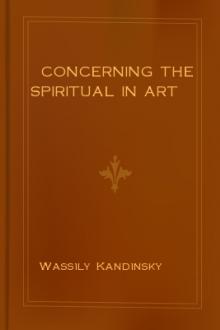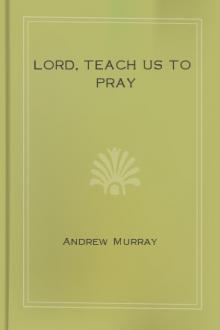Genre Religion. Page - 10

Gauguin. The best known representative isMaurice Denis. But he has become a slave to sentimentality, andhas been left behind. Matisse is the most prominent French artistwho has followed Gauguin with curves. In Germany a group of youngmen, who form the Neue Kunstlevereinigung in Munich, work almostentirely in sweeping curves, and have reduced natural objectspurely to flowing, decorative units.
But while they have followed Gauguin's lead in abandoningrepresentation both of these two groups of advance are lacking inspiritual meaning. Their aim becomes more and more decorative,with an undercurrent of suggestion of simplified form. Anyone whohas studied Gauguin will be aware of the intense spiritual valueof his work. The man is a preacher and a psychologist, universalby his very unorthodoxy, fundamental because he goes deeper thancivilization. In his disciples this great element is wanting.Kandinsky has supplied the need. He is not only on the track ofan art more purely spiritual than was concei

worth while to call down my friends; and she seemed perfectly well pleased with the idea. An audience was what she wanted,--it mattered not whether high or low, learned or ignorant. She had things to say, and was ready to say them at all times, and to any one. I called down Dr. Beecher, Professor Allen, and two or three other clergymen, who, together with my husband and family, made a roomful. No princess could have received a drawing-room with more composed dignity than Sojourner her audience. She stood among them, calm and erect, as one of her own native palm-trees waving alone in the desert. I presented one after another to her, and at last said,-- "Sojourner, this is Dr. Beecher. He is a very celebrated preacher." "IS he?" she said, offering her hand in a condescending manner, and looking down on his white head. "Ye dear lamb, I'm glad to see ye! De Lord bless ye! I loves preachers. I'm a kind o' preacher myself." "You are?" said Dr. Beecher. "Do you preach from the Bible?" "No, honey, can't preach from

religion, proves that the secret of human misery was at last solved by this divine self-sacrifice, and the true path to Nirvana opened.
The joy that he brought to the hearts of others, Buddha first tasted himself. He found that the pleasures of the eye, the ear, the taste, touch and smell are fleeting and deceptive: he who gives value to them brings only disappointment and bitter sorrow upon himself. The social differences between men he found were equally arbitrary and illusive; caste bred hatred and selfishness; riches strife, envy and malice. So in founding his Faith he laid the bottom of its foundation-stones upon all this worldly dirt, and its dome in the clear serene of the world of Spirit. He who can mount to a clear conception of Nirvana will find his thought far away above the common joys and sorrows of petty men. As to one who ascends to the top of Chimborazo or the Himalayan crags, and sees men on the earth's surface crawling to and fro like ants, so equally small do bigots and sectarians a

r, for the awakening of the latent powers in man, so that all may be guided safely through the danger-zone and be as well fitted as possible to use these new faculties. Effort is made to blend the love without which Paul declared a knowledge of all mysteries worthless, with a mystic knowledge rooted and grounded in love, so that the pupils of this school may become living exponents of this blended soul-science of the Western Wisdom School, and gradually educate humanity at large in the virtues necessary to make the possession of higher powers safe.
Note:--
Pages 19 to 26 inclusive, describing Mt. Ecclesia, have been transferred to the back of the book. (Transcriber's Note: They are pages 191 through 200.)
CHAPTER II.
THE PROBLEM OF LIFE AND ITS SOLUTION
THE PROBLEM OF LIFE.
Among all the vicissitudes of life, which vary in each individual's experience, there is one event which so

and then adds, 'and is now.' He came to baptize with the Holy Spirit; the Spirit could not stream forth till He was glorified (John i. 33, vii. 37, 38, xvi. 7). It was when He had made an end of sin, and entering into the Holiest of all with His blood, had there on our behalf received the Holy Spirit (Acts ii. 33), that He could send Him down to us as the Spirit of the Father. It was when Christ had redeemed us, and we in Him had received the position of children, that the Father sent forth the Spirit of His Son into our hearts to cry, 'Abba, Father.' The worship in spirit is the worship of the Father in the Spirit of Christ, the Spirit of Sonship.
This is the reason why Jesus here uses the name of Father. We never find one of the Old Testament saints personally appropriate the name of child or call God his Father. The worship of the Father is only possible to those to whom the Spirit of the Son has been given. The worship in spirit is only possible to those

the heaven, the embodiment of light, heat, and the breath of life, produced offspring who were of a much less material nature than his son Oceanus. These other children of his were supposed to occupy the intermediate space which divided him from Gæa. Nearest to Uranus, and just beneath him, came Aether (Ether), a bright creation representing that highly rarified atmosphere which immortals alone could breathe. Then followed Aër (Air), which was in close proximity to Gæa, and represented, as its name implies, the grosser atmosphere surrounding the earth which mortals could freely breathe, and without which they would perish. Aether and Aër were separated from each other by divinities called Nephelae. These were their restless and wandering sisters, who existed in the form of clouds, ever {13} floating between Aether and Aër. Gæa also produced the mountains, and Pontus (the sea). She united herself with the latter, and their offspring were the sea-deities Nereus, Thaumas, Phorcy

s of our present progress could justify this deed; and that though everybody from the creation of the world had held it to be necessary, on whatever theory, I knew it to be unnecessary and bad; and therefore the arbiter of what is good and evil is not what people say and do, nor is it progress, but it is my heart and I. Another instance of a realization that the superstitious belief in progress is insufficient as a guide to life, was my brother's death. Wise, good, serious, he fell ill while still a young man, suffered for more than a year, and died painfully, not understanding why he had lived and still less why he had to die. No theories could give me, or him, any reply to these questions during his slow and painful dying. But these were only rare instances of doubt, and I actually continued to live professing a faith only in progress. "Everything evolves and I evolve with it: and why it is that I evolve with all things will be known some day." So I ought to have formulated my faith at that time.
On

ttalus, a Christian and a Roman citizen, was loudly demanded by the populace and brought into the amphitheatre; but the governor ordered him to be reserved, with the rest who were in prison, until he had received instructions from the emperor. Many had been tortured before the governor thought of applying to Antoninus. The imperial rescript, says the letter, was that the Christians should be punished, but if they would deny their faith, they must be released. On this the work began again. The Christians who were Roman citizens were beheaded; the rest were exposed to the wild beasts in the amphitheatre.
The war on the northern frontier appears to have been uninterrupted during the visit of Antoninus to the East, and on his return the emperor again left Rome to oppose the barbarians. The Germanic people were defeated in a great battle A.D. 179. During this campaign the emperor was seized with some contagious malady, of which he died in the camp, A.D. 180, in the fifty-ninth year of his age. His son Commo

s, the rain falling through the leaves, or the dew creeping over the grass and making it silver - would all be tainted for me, and lose their healing power, and their power of communicating joy. To regret one's own experiences is to arrest one's own development. To deny one's own experiences is to put a lie into the lips of one's own life. It is no less than a denial of the soul.
For just as the body absorbs things of all kinds, things common and unclean no less than those that the priest or a vision has cleansed, and converts them into swiftness or strength, into the play of beautiful muscles and the moulding of fair flesh, into the curves and colours of the hair, the lips, the eye; so the soul in its turn has its nutritive functions also, and can transform into noble moods of thought and passions of high import what in itself is base, cruel and degrading; nay, more, may find in these its most august modes of assertion, and can often reveal itself most perfectly through what was intended to desecrate

entity follows your awareness, and since you are ultimately everything, it can and will identify with whatever is in your awareness. This is the danger of a teaching that doesn't point to or convey the existence of true nature. If something is not even talked about or considered, it is much less likely that awareness will notice it, and also much less likely that identity will ultimately shift into it. This is why it is important to teach and explore the nature of all of the qualities of presence such as joy, peace, and love, so that awareness begins to touch them and eventually identity shifts to the underlying truth of Being.
A subtle distinction needs to be made between your true identity and the sense of self you have in any moment. Your true identity has and always will be the infinite spaciousness of Being, including all forms, both physical and subtle, and all of the formless emptiness of pure space. But your sense of self is a flexible means for this limitless Being to experience itself from ma